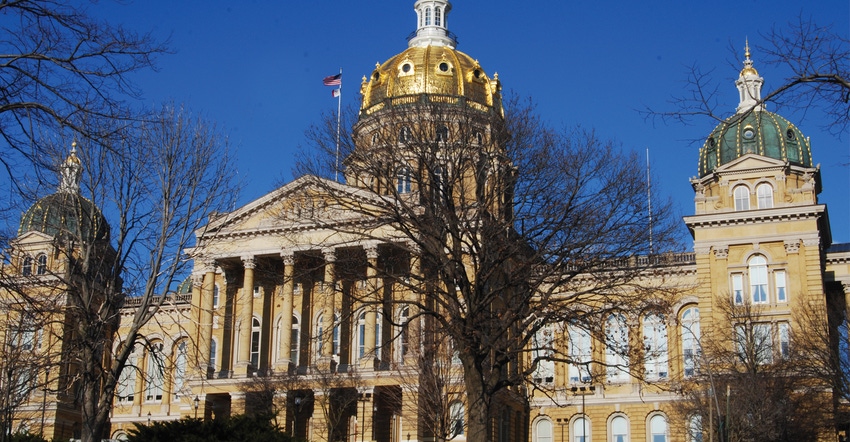August 18, 2020

The 2020 Iowa Legislature passed a number of bills that Gov. Kim Reynolds signed into law. Here is a summary of new laws impacting Iowa agricultural producers and rural landowners. Most of these laws went into effect July 1:
Permit for ag experiences. This law prohibits counties from requiring a permit for ag producers offering “agricultural experiences.” An agricultural experience is defined as “any agriculture-related activity, as a secondary use in conjunction with agricultural production, on a farm which activity is open to the public with the intended purpose of promoting or educating the public about agriculture, agricultural practices, agricultural activities or agricultural products.”
This law would prevent a county from requiring a farmer from obtaining a permit to host a harvest dinner or a group of students on his or her farm. The scope of ag experiences covered by the law, however, is unclear. During debate, legislators stated that weddings or rock concerts would not be covered. The law specifically prevents the imposition of special exceptions, variances, conditional use permits or special-use permits, but it is unclear whether a county could impose other requirements upon these producers.
County zoning of ag-exempt property. Counties generally have the authority to develop zoning regulations for their rural areas. But farms have been exempt from this reach. This means an exempt farmer can build an ag building or a grain bin on his or her property without getting a permit from the county.
Iowa law has long exempted from county zoning regulations all land, farmhouses, farm barns, farm outbuildings or other buildings or structures that are primarily adapted, by reason of nature and area, for agricultural purposes. The new law adds that a county shall not require an application, an approval or the payment of a fee in order for an ordinance to be deemed inapplicable to land, farm barns, farm outbuildings, or other buildings or structures that are primarily adapted for use for agricultural purposes. Land enrolled in a soil or water conservation program qualifies for the ag exemption.
The intent of this provision is to prevent counties from imposing additional zoning burdens on otherwise exempt agricultural activities. It was written specifically in response to a county’s unified development ordinance, which would have required an application and a hearing for any farm of less than 40 acres to build a new building, such as a confined animal feeding operation.
Critics of the law point out that the definition of whether property is adapted for agricultural purposes is sometimes unclear and that a hearing might be helpful to a property owner seeking confirmation that the property is exempt. It isn’t clear under the new law whether voluntary hearings or applications for determining exempt status would be allowed or whether all enforcement would occur after the building is built.
Updated hemp law. This new law amends the Iowa Hemp Act, which was passed last year to facilitate the legal production of hemp in Iowa. The Iowa plan was approved by USDA on March 20,. The new law allows the manufacture, sale and consumption of “consumable hemp products” by humans if all the following conditions apply:
The consumable hemp product was manufactured in Iowa in compliance with Iowa Code Chapter 204.
The hemp contained in the consumable hemp product was produced exclusively in Iowa in compliance with Iowa Code Chapter 204.
The consumable hemp product complies with certain packaging and labeling requirements.
The law specifically prohibits the possession, use, manufacture, marketing, transport, delivery or distribution of hemp if the intended use of the hemp is inhalation. Iowa agencies are currently working on drafting rules to implement the new law. Questions remain regarding the interaction between federal regulations (which in many cases still ban the consumption of hemp products) and the new Iowa law.
Animal mistreatment. The legislature expanded the definition of crimes involving mistreatment of animals, excluding livestock and certain wild animals. It states that animal abuse occurs when a person intentionally, knowingly or recklessly acts to inflict injury, serious injury or death on an animal by force, violence or poisoning. The crimes range from a serious misdemeanor for injuries that are not serious and do not result in death to a Class D felony for repeat offenses.
Transportation. One new transportation law eliminates the yearly wide-load permit requirement for vehicles transporting hay, straw, stover or bagged livestock bedding, if the width doesn’t exceed 12 feet, 5 inches. The prior limit was 8 feet, 6 inches.
Another new law provides that a farmer or the farmer’s hired help (18 years of age or older) is not a chauffeur when operating a special truck owned by the farmer and used exclusively to transport the farmer’s own products or property to a destination no more than 100 miles from farmland owned or rented by the farmer.
Food operation trespass. A new law prohibits “food operation trespass” in Iowa. A person commits food operation trespass by entering or remaining on the property of a food operation without the consent of a person who has real or apparent authority to allow the person to enter or remain on the property.
A person who commits a first offense of food operation trespass is guilty of an aggravated misdemeanor. A second and subsequent offense is a Class D felony. The purpose of this new law is to protect biosecurity and the safety of the food supply chain. This is the Iowa Legislature’s third attempt in a decade to enact legislation to impose penalties on people trespassing on agricultural production facilities. The two prior laws are embroiled in First Amendment litigation.
Hunting revisions. New legislation lowers the age of eligibility for a special senior statewide antlerless deer-only crossbow deer hunting license from 70 to 65 years of age. Another new law allows a hunter to use a trained, leashed dog to retrieve a wounded deer. The leash must be no more than 50 feet in length. Non-resident children under the age of 16 may now hunt game (other than deer and wild turkey) without a license if they are accompanied by an adult who has a hunting license.
Another new law allows a person 20 or younger to use a pistol or revolver to hunt if they are accompanied by a person 21 or over who has a hunting license. Finally, it is now legal to hunt coyotes in Iowa using an infrared light source, except during muzzleloader, bow or shotgun deer hunting season.
More information on these and other laws can be found at calt.iastate.edu.
Tidgren is an attorney and director of the Center for Ag Law and Taxation at ISU. Contact her at [email protected].
About the Author(s)
You May Also Like






